The 4 Ps of Marketing: What You Need to Know (With Examples)

The 4 Ps of marketing — you’ve probably heard about them from a friend, a textbook, or even at school.
I know it sounds like a boring topic that’s common sense, but there is more to it than meets the eye.
And no, it’s not just for large companies. The smaller you are, the more important for you it is to leverage the 4 Ps of marketing.
So before we dive into it, let’s first break down what they are…
What Are The 4 Ps of Marketing?
The 4 Ps of marketing is a marketing is a concept that summarizes the four basic pillars of any marketing strategy.
The four Ps of marketing are:
- Product: What you sell. Could be a physical good, services, consulting, etc.
- Price: How much do you charge and how does that impact how your customers view your brand?
- Place: Where do you promote your product or service? Where do your ideal customers go to find information about your industry?
- Promotion: How do your customers find out about you? What strategies do you use, and are they effective?
It sounds simple and it really is. The harder part is implementing the 4ps of marketing, which we will get into in the next sections.
The theory behind the 4 Ps of marketing is that covering all 4 Ps will result in higher sales. But, sadly nothing is quite that easy.
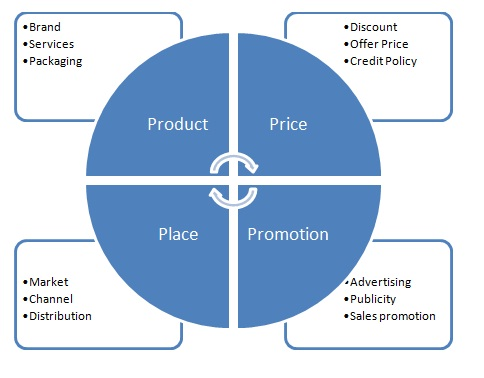
The origin of the concept, also known as marketing mix, goes back to 1960 when McCarthy introduced it in his book Basic Marketing: A Managerial Approach.
I know that’s ages ago, but the 4 Ps/marketing mix concept is just as valid today.
Let’s dive into the concepts and look at 4 Ps of marketing examples to understand how you can apply this to your own company.
The First P of Marketing: Product
The product is what the company sells.
It might be a product like a soft drink in the beverage industry or dresses in a clothing store. Or these days it may even be software like Ubersuggest.
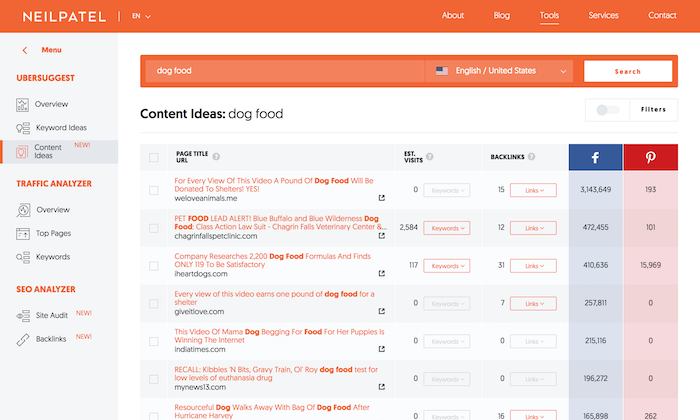
It could also be services, such as consulting or a paid speaking gig or even a therapy session.
In short, the product is everything that is made available to the consumer.
In the 4 Ps strategy, this means understanding what your offer needs in order to stand apart from competitors and win over customers.
In other words, what makes your product so great or unique? Because if you don’t stand out it’s going to be hard to thrive.
For example, you may know about my product Ubersuggest, but you probably know about a handful of my competitors.
So what’s the big thing that makes my product stand out from everyone else?
I don’t focus on features, I don’t have 100s of reports. Instead, I focus on usability. My goal is to make Ubersuggest really easy to use, especially if you are new to marketing.
On the flip side, my competitors focus on ad agencies and really advanced marketers. I built something for a different target market, even though I am in a crowded market place.
How to Create an Amazing Product Your Customers Love
I want you to do something simple. Go to Hotjar, signup for a free account, and run a poll. Just like the one below.
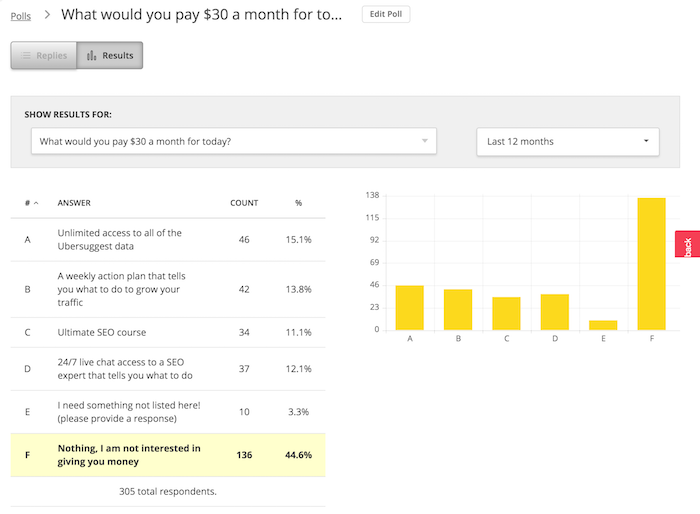
I’ve been running polls for a while now, but if you are starting off I would ask open-ended questions like:
- What’s the biggest problem I can help you solve? This will give you an idea of what your product needs to do.
- What’s your favorite marketing product and why? You’ll want to replace the word “marketing” with whatever industry you are in… this question gives you an idea about who your competition is and what they are doing right.
- Why did you come here today? This will tell you why people come to your site and what they are looking for.
- How can we make our product better? This is great if you already have a product up as you will get real feedback.
- What don’t you like about COMPETITOR ABC? Replace competitor ABC with your competition’s name… this question tells you where there is an opportunity.
I want you to pay special attention to the last question. It really helps you identify how you can differentiate yourself from the competition.
Now, before you go and build a product (or make yours better if you already have one), don’t invest too much time and money without getting feedback.
For example, if I were to add a new feature to Ubersuggest, I wouldn’t just build it. I would get it designed, show you first, get feedback, and then adjust from there.
That way I won’t waste months’ worth of time building a product you don’t want to use.
The Second P of Marketing: Price
Price is simple, it refers to how much you charge for your product (or service).
Although it’s simple to understand, it’s really hard to come up with the “right” price. The one that doesn’t just drive the most amount of sales but also drives the most profit.
The real question is, how do you want to be perceived?
Amazon wants to be the place where you can get the best-valued products from A to Z. And of course, delivered fast.
My buddies’ company, Imperia Caviar offers high-end caviar at low prices. He’s able to get the same caviar that big brands charge thousands of dollars.
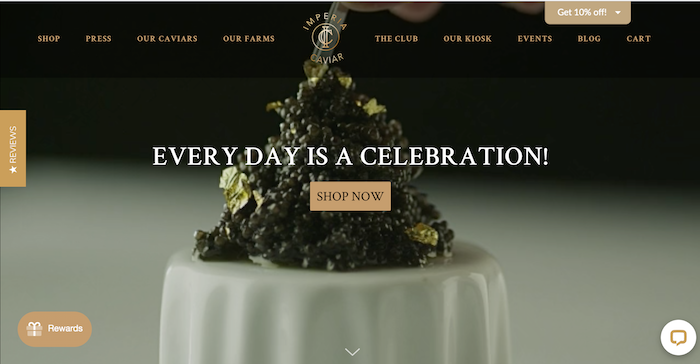
You would think having a cheap price is cheapening his brand, but instead, he is bringing transparency to the market and educating people on how caviar isn’t really expensive… it’s actually just a marketing ploy.
I take a similar approach to Ubersuggest. I don’t think marketing software and education should be expensive. So I give a lot away for free or super cheap.
Do you think that has cheapened my brand or hurt it? Well, let’s look at the data:
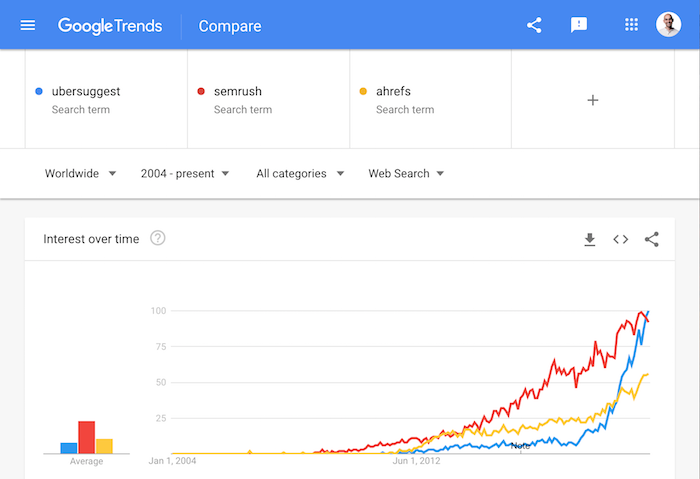
I guess not. 🙂
On the flip side, would Ferrari be Ferrari if their cars were selling for $10,000? Probably not.
How to Pick the Right Price for Your Product
By no means am I a pricing expert, so I don’t want to tell you what to price your product.
I will tell you to read the Price Intelligently blog. Those guys know to price like the back of their hand and have dozens of articles that will teach you exactly how to price your product.
It’s important to think about pricing, especially if you are in a crowded space. My rule of thumb is: If you are in a new space or already a leader, you can charge a premium amount.
On the flip side, if your space is saturated and you are late to the market, you’ll want a cheaper price (if not the cheapest price).
Some questions you should ask yourself are:
- What would be the lowest price you are willing to sell your product?
- What would be the highest price that consumers would be willing to pay?
- How sensitive to price are your customers?
- What prices do current leaders in your niche charge?
- How does your price compare to the competition?
The Third P of Marketing: Place
“Place” is another word for location.
As they say in marketing, it’s all about location, location, location.
I once ran a tech conference in Los Angeles called Twiistup.

It was a cool event with LA vibes and celebrities. I didn’t create the event, I bought it out years ago.
But you know what? It failed.
It wasn’t because the event wasn’t good, it was more so that I moved it to a terrible location.
I moved it from Santa Monica, which is the heart of the Los Angeles tech scene, to the valley, which is an hour’s drive from where all the tech companies are located.
In other words location, location, location.
You have to pick a location where your customers are. Don’t expect them to come to you, you have to go to them.
How to Pick the Right Place
The web is this virtual world. And although the location (place) may seem irrelevant, it really isn’t.
Just think of it this way… if I put my company all over Tiktok, what do you think would happen?
Well, I wouldn’t generate any new clients for my ad agency because none of my ideal customers are on Tiktok.
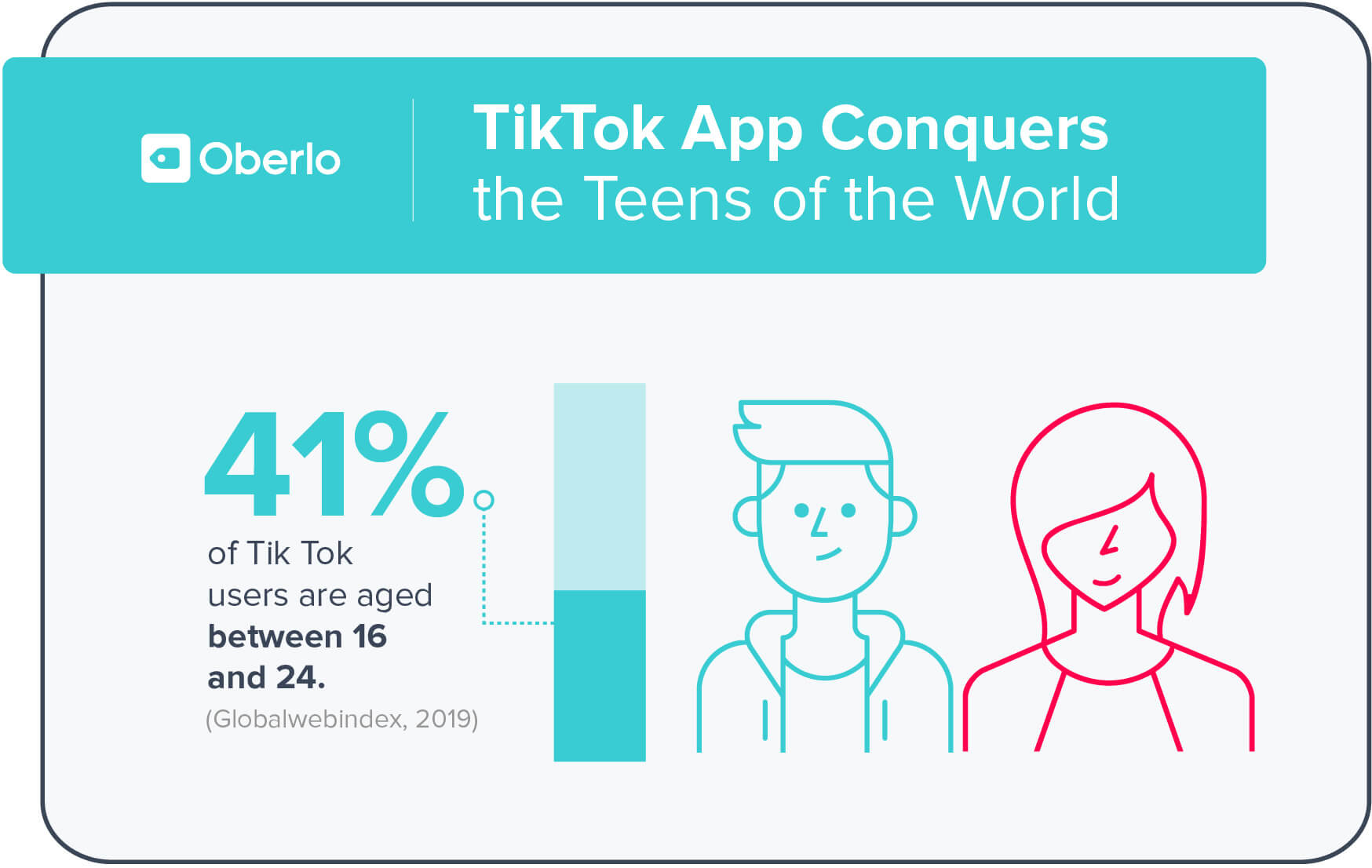
Do you think a bunch of 16 to 24-year-olds are looking for marketing services? If we offered services where we helped you get more social followers, sure, but we don’t offer that.
Think of the platforms and places your ideal customers are and be there.
That could be a specific site like Google or even an offline venue like conferences. Don’t try to bring your customers to you, go to where your customers are; it’s much easier.
Here are some simple questions to ask yourself so you can find the right place.
- Where is your customer?
- Which outlets (online and offline) sell your product?
- Which distribution channels are currently working for you?
- Do you sell directly to businesses or consumers?
- Do you sell directly to your end customer or do you have to go through middlemen?
- Where are your competitors?
The customer should always be at the center of your decision, but it’s important to also include aspects of the other Ps that we discussed.
The Fourth P of Marketing: Promotion
My favorite P (and the one I tend to blog about the most) is promotion.
Once you’ve optimized the previous three Ps of marketing, it’s time to promote your offer.
To be clear, when I talk about promotion, I am not just talking about getting your brand out there. I am talking about generating revenue.
What’s the point of promotion if you can’t drive sales?
With all of the channels out there, which ones do you start with first?
Well, I want you to go here and put in your competitor’s URL.

If they are big, you’ll see data on how much traffic they are generating, which keywords they rank for on Google, the sites that link to them and talk about them, and even how many social shares they are generating.
If they are small, you won’t see any data. You’ll have to put in a bigger competitor.
Another site that you should use is Similar Web. Put in your competitor’s URL and you’ll see tons of data on how they promote themselves.

What’s cool about the web today, versus when I first got into online marketing, is that there are tons of tools that make your life easy. So use them to your advantage. 😉
How Do You Promote Well?
I want you to start off by asking yourself the following questions:
- Which channels does your audience use the most to consume information?
- What kind of message tends to be more effective when promoting your solutions?
- What is the ideal period for promoting your product?
- Is there any concern about seasonality?
- How do your competitors plan and carry out their promotion?
Again, you can use the tools I mentioned above to get a jump start. Another thing I would highly recommend is that you look at Facebook’s ad library.
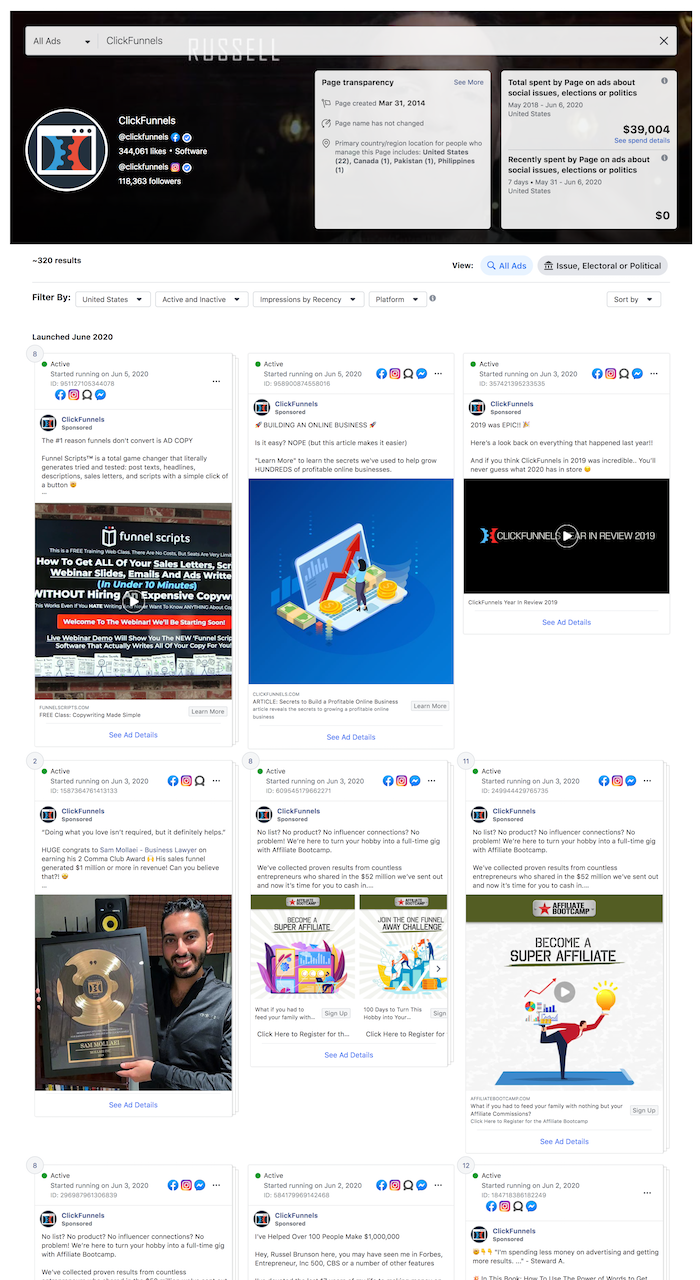
It will show you the ads that your competition runs and, more importantly, the messaging they use.
Now, I won’t bore you to death about promotion tips as I already have tons of blog posts on that. But I would start off with these:
- Online marketing
- SEO
- Social media
- Google ads
- Facebook ads
- Affiliate marketing
- Content marketing
Conclusion
The 4 Ps of marketing may seem boring, but they are essential to creating a successful marketing plan.
Without them, you can’t differentiate yourself from the competition.
No one cares for another me-too company. We all want something unique, special; something we resonate with.
How do stand out from your competitors? You leverage the 4 Ps of marketing.
How are you leveraging the 4 Ps of marketing? Is it helping you drive profits?
The post The 4 Ps of Marketing: What You Need to Know (With Examples) appeared first on Neil Patel.
from Neil Patel https://ift.tt/30voUyB
No comments